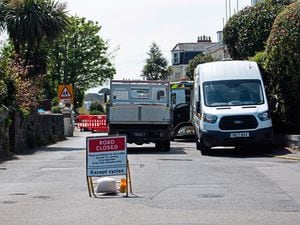Charges fail to drive islanders into more eco-friendly vehicles
CHARGES under the Integrated Transport Strategy have failed to drive people into smaller, less polluting vehicles as was originally intended.

Environment & Infrastructure’s Traffic and Highways Service has responded to a Guernsey Press enquiry with the first detailed analysis of how effective first registration duty has been.
It has stressed that the States’ decision to water down the charge in July 2015 to be based solely on emissions or engine size, scrapping an intended width tax, severely inhibited its chance of changing behaviour.
First registration duty began in May 2016 with the intention of raising £1.15m. annually to fund projects in the strategy – more than a third less than the intended £3.92m. originally planned.
‘The potential additional benefit of encouraging modal shift was severely compromised,’ a Traffic and Highways spokesman said.
‘Under the Transport Strategy as eventually approved by the previous States, first registration duty is an important revenue stream but is not a significant mechanism in terms of influencing consumer behaviour, as it would have been in its original form. However, the duty remains a key funding element for the Integrated Transport Strategy along with the retention of bus fare income and a cash limit increase for the bus contract.’
Between 3 May 2016 and 31 December 2016 a total of 2,528 motor vehicles and 359 motorcycles were registered, of which 1,589 were eligible for first registration duty and 1,299 were exempt. Total income was around £635,000.
Vehicle registrations then went up for the same period in 2017.
A total of 2,929 motor vehicles/motorcycles were registered, of which 1,007 were exempt from duty. Income was about £796,000.
In 2017 as a whole, a total of 4,508 motor vehicles/motorcycles were registered and annual income totalled £1,193,780, slightly exceeding the intended budget.
Data comparing registrations in the emission/engine size bands show that there has been ‘no significant change’ since the duty came in.
Annual motor car registration numbers have been declining steadily since 2008 from 6,011 cars to 3,554 in 2017.
‘A significant part of this decline reflects the reduction in hire cars imported temporarily into the island but there is no doubt that annual car registrations, both new and used, are continuing to fall. However, there is no suggestion that this has anything to do with the introduction of first registration duty but is more likely a reflection of economic considerations.’
The maximum duty rate is £690.
In percentage terms, the number of petrol and diesel vehicles combined registered in the most polluting banding, three to six, actually grew from 53% in 2015 when there was no duty, to 57.7% in 2017, the first full year of it being in place.
Traffic and Highways attributed a decline in larger diesel car registrations (1,301 to 1,600cc) recently in part to the falling hire car market, but more lately to negative publicity and reduced production of these vehicles.
The largest number of vehicles being registered are in the lowest emission non-diesel bands.
‘There is no evidence to suggest that the age profile of cars registered on the database has altered since first registration duty was introduced, which again is unsurprising given the very low rates of duty currently being applied,’ the spokesman said.





